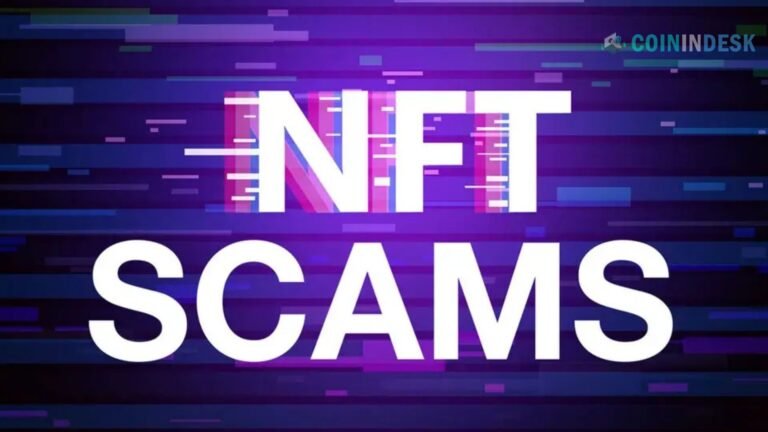Millions of investors, collectors, and art fans have been captivated by NFTs (Non-Fungible Tokens), swiftly gaining renown in the flourishing realm of blockchain and digital assets. Unfortunately, frauds have been popping up with the popularity of NFT airdrops, preying on people’s enthusiasm for these virtual items. The potential for substantial monetary and data losses makes many frauds more than simply an annoyance. This article will explain NFT airdrop Scams, how they operate, and how to avoid falling victim and safeguarding your digital valuables.
Understanding NFT Airdrop Scams
When done well, NFT airdrops are a fantastic method for projects to engage communities, reward loyal users, and spark interest in new initiatives. An airdrop is distributing NFTs, tokens, or other assets straight to user wallets. This happens frequently as a promotion or reward. A sad side effect of these airdrops is the proliferation of NFT airdrop frauds, which fool users into divulging personal information or even their digital wallet credentials.
What Are NFT Airdrop Scams?
In NFT airdrop scams, con artists pose as legitimate airdrop campaigns or make up their own to trick unsuspecting users into parting with their money. By tricking people into clicking on malicious websites, connecting their digital wallets to insecure platforms, or divulging personal information, scammers claim to offer free NFTs or tokens. Scammers might steal money or personal information if they get access to sensitive areas.
Types of NFT Airdrop Scams Include
- Phishing Scams: Scammers pose as legitimate NFT platforms in email or DM campaigns to deceive consumers into divulging personal information.
- Fake Airdrops and Giveaways: Pretenders who promote fake airdrops trick their victims into thinking they’re taking part in a real giveaway.
- Gas Fee Scams: Some con artists entice victims by demanding a small transaction fee to access their airdrop, but they want the victims to pay the con artist directly.
How NFT Airdrop Scams Work
Scams with NFT airdrops employ both psychological and technological tricks to trick their victims. A basic rundown of how these schemes work is as follows:
Creating a Sense of Urgency and Excitement
Scammers use online forums, social media, and email to promote exclusive or limited-time airdrops, taking advantage of the excitement over NFTs. Due to this overwhelming sense of urgency, users are compelled to respond hastily without thoroughly examining the offer’s authenticity.
Impersonating a Trusted Source
As a common tactic, scammers will use names, logos, and URLs that seem suspiciously like those of legitimate NFT enterprises or influencers. When people associate a reputable source with an airdrop, such as a well-known company or initiative, they are more inclined to believe it.
Requesting Wallet Access or Sensitive Information
After clicking the link, victims are typically asked to attach their crypto wallet to receive their reward. However, the victim gives the con artist access to their wallet instead of an NFT. Scammers can also urge victims to pay a minor fee (a common tactic in gas fee scams) or fool them into signing a document that grants them ownership of their assets.
Stealing Digital Assets or Sensitive Data
Once they have access, the con artist can steal the victim’s NFTs, tokens, or anything else in their wallet. Seed phrases and private keys are examples of sensitive data scammers aim for since they provide the perpetrator complete access to the victim’s wallet and assets.
How to Identify NFT Airdrop Scams
One way to protect yourself against NFT airdrop fraud is to be aware of the warning signs. Here are a few essential red flags:
Too-Good-to-Be-True Offers
To promote a project, legitimate NFT airdrops are usually employed, but they don’t offer unattainable money or special privileges for free. An airdrop is probably not legit if it promises you will get valuable NFTs with minimal to no work on your part.
Suspicious URLs and Domain Names
Before linking your wallet or inputting any information, carefully check the URL of any website. Scammers frequently use misspelled or extra characters in their URLs to make them seem like popular NFT sites.
Direct Messages from Support or Admin Accounts
Always use caution when responding to direct messages on social media from unknown users, particularly those advertising airdrops. Regarding airdrops, actual NFT initiatives rarely use private messaging to reach out to people. Information from verified accounts or official announcements is more trustworthy.
Requests for Private Keys or Seed Phrases
Any reputable NFT platform will never request your private key and seed phrase. This should serve as a warning that the platform or individual in question is trying to defraud you somehow.
High Gas Fees or Transaction Costs
Exercise caution if an airdrop imposes exorbitant transaction fees, such as a high gas price. Although small fees are often required, particularly on Ethereum, suspiciously high costs could raise red flags. Always check the official platform or community channels to confirm airdrop terms.
How to Protect Yourself from NFT Airdrop Scams
Here are some tips to keep your digital assets safe and steer clear of NFT airdrop scams:
Research the Source
Make sure you check the source before joining any airdrop. To verify the legality of the airdrop, visit the project’s official website and social media platforms. You may also visit trustworthy online communities or forums for the latest information about recognized frauds.
Use Trusted Wallets and Platforms
Never link your wallet to a site you aren’t acquainted with, and only use trusted wallets like MetaMask or Trust Wallet, which have robust security measures. Additionally, users of trusted wallets are usually alerted before they sign any suspicious transactions.
Enable Two-Factor Authentication (2FA)
To make your accounts even more secure, turn on two-factor authentication if your wallet or exchange platform supports it. This extra layer of protection can keep intruders out even if your password is cracked.
Double-Check URLs and Links
Before clicking on any URL, especially one from an unknown source, be sure it is safe. Inconsistencies in the domain name are typical for fake websites to pass themselves as genuine. Put reliable websites in your bookmarks and avoid links received in emails or social media.
Educate Yourself on Security Protocols
Gain a leg up in the fraud detection game by studying the fundamentals of blockchain security, such as the operation of digital wallets, private keys, and smart contracts. Your ability to securely traverse the NFT space is directly proportional to your level of understanding in this area.
Real-Life Examples of NFT Airdrop Scams
The OpenSea Phishing Scam
A phishing site imitating OpenSea, a well-known NFT marketplace, was recently accused of fraud. The fraudulent website encouraged users to link their wallets to receive a free NFT. The victims lost much money because they allowed the crooks to access their wallets.
Fake Bored Ape Yacht Club (BAYC) Airdrop
Scammers preyed on users’ enthusiasm for owning a valuable NFT by promoting a phony airdrop purporting to be from the well-known BAYC development. Many users had their funds stolen after linking their wallets in an attempt to claim the fraudulent NFTs.
What to Do If You Fall Victim to an NFT Airdrop Scam
What you should do right away if you’ve been conned out of your NFTs in an airdrop scam:
Disconnect Your Wallet from the Site
Cut off all access to your money when you detect that you are dealing with an untrustworthy site. Most wallet applications allow you to view the websites your wallet is linked to and will enable you to disconnect from them.
Move Your Assets to a New Wallet
As a safety measure, move any remaining assets from your hacked wallet to an unrelated one. Do not make any further transactions using the compromised wallet.
Report the Scam
Notify the appropriate social media networks and the NFT platform or project posed as in the fraud. If more people are made aware of the scam, fewer people will fall for it.
Increase Your Security Measures
Enabling two-factor authentication, regularly changing passwords, and storing significant amounts of cryptocurrency in hardware wallets are all excellent ways to beef up your security. These safety measures can protect your funds and prevent further losses.
Read More: NFT Marketing Agencies How They Can Boost Your NFT Project
Conclusion
NFT airdrop frauds are becoming increasingly common in digital assets, taking advantage of naive users eager to get free NFTs and tokens. You may enjoy the NFT area without fear if you keep your guard up, learn the tricks con artists utilize, and adhere to standard digital security procedures. Always ensure an airdrop is authentic, and never skimp on security; remember, if it seems too good to be true, it probably is.
[sp_easyaccordion id=”5481″]


